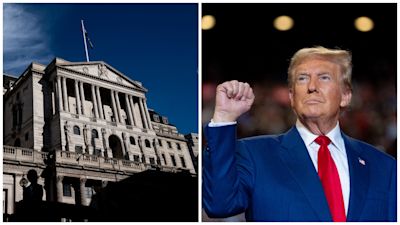Bank cuts interest rates and signals there's more to come but the elephant in the room is Republican

ITV News Business and Economics Editor Joel Hills reports on how Donald Trump's presidency could affect interest rates
It’s a cut, the second in three months and it comes with the suggestion that, all being well, interest rates will fall further.
Inflation has faded faster than the Bank of England expected back in August, wage growth has moderated, although economic growth has been a little weaker.
The Monetary Policy Committee voted 8-1 to lower the cost of borrowing to 4.75% from 5%.
“We need to make sure inflation stays close to target, so we can’t cut interest rates too quickly or by too much. But if the economy evolves as we expect it’s likely that interest rates will continue to fall gradually from here," the Bank's governor Andrew Bailey said.
What happens next to rates will depend to a large extent on two things: the impact of the Chancellors’ Budget and how Donald Trump behaves in power.
The Bank shares the Office for Budget Responsibility’s view that the measures Rachel Reeves announced last week - the cap on bus fares, the rise in vehicle excise duty, the freeze in fuel duty, VAT on private school fees and the hike in national insurance for employers - will combine to push up prices a little in the next two years.
Inflation is now forecast to peak at 2.75% before falling back to target in 2027 - a year later than previously expected.
The Budget is also judged to raise growth temporarily as government spending ramps up.
The great unknowns are the higher costs the chancellor loaded onto businesses with national insurance and the minimum wage set to rise next April.
The Bank assumes wages will rise more slowly in the years to come as a result, but prices or unemployment may rise by more than the Bank expects.
But the elephant in the room is Republican.
The Bank’s minutes make no mention of Donald Trump or trade war, but the president-elect sounds determined to start one.
Trump sees trade as a zero-sum game - a competition that creates winners and losers.
Subscribe free to our weekly newsletter for exclusive and original coverage from ITV News. Direct to your inbox every Friday morning.
If the United States buys more from a country than it sells to that country, then the US is “losing” and Trump doesn’t lose.
The US has been running trade deficits since the 1970s, with China, the European Union, Mexico and, to a lesser extent, the UK.
Trump wants to correct the imbalance. He promises to slap taxes of 10-20% on all imported goods and up to 60% on imports from China.
He also pledges mass deportations, a crackdown on immigration and a massive fiscal loosening (tax cuts and spending increases) despite the high level of US national debt.
The bond market lurched as a Trump victory loomed into view.
The effective interest rate the US government pays to borrow money has risen sharply, in anticipation of higher growth and inflation.
When US bond yields rise, there are ripple effects. Borrowing costs across advanced economies tend to increase as well.
In the last seven days, there has been a significant rise in UK interest rate expectations. Investors were pricing in the best part of five interest rate cuts (including this one) by the end of 2025. They are now betting on three.
How much of that is down to the Budget? How much is the US election result? The Bank doesn’t offer a view.
Last month, the International Monetary Fund warned that a scenario of trade tariffs, reduced migration, US fiscal stimulus and some spillover effects to financial conditions could seriously damage growth in advanced economies - wiping around one percent off output.
That’s a big hit. Is it plausible? The minutes of the Monetary Policy Committee make no mention of Trump or even trade policy uncertainty.
Trump is wildly unpredictable. The Bank may be hoping he is bluffing but the president-elect’s election victory is so emphatic that he has a mandate to be as bold as he wants.
Want a quick and expert briefing on the biggest news stories? Listen to our latest podcasts to find out What You Need To Know